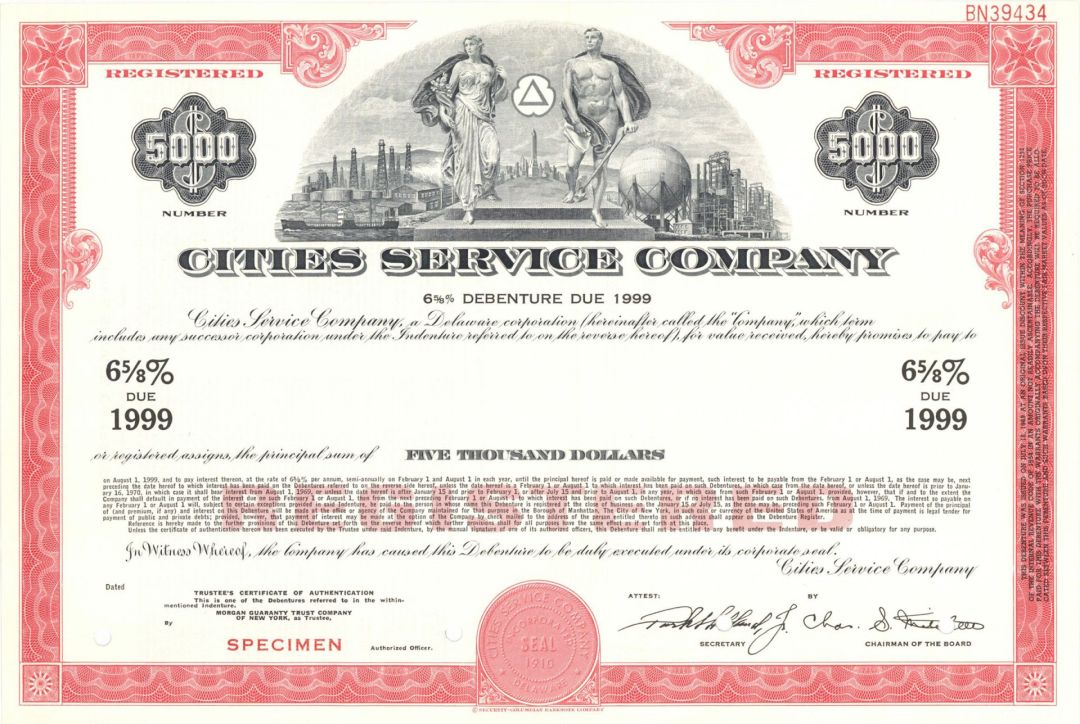Cities Service Co. - $5,000 Specimen Bond
Inv# SE3656 Specimen Bond$5,000 6 5/8% Specimen Bond printed by Security-Columbian Banknote Company.
Citgo Petroleum Corporation (or Citgo, stylized as CITGO) is a United Statesâbased refiner, transporter and marketer of transportation fuels, lubricants, petrochemicals and other industrial products. Headquartered in the Energy Corridor area of Houston, it is majority-owned by PDVSA, a state-owned company of the Venezuelan government (although due to U.S. sanctions in 2019, they no longer economically benefit from Citgo).
The company traces its heritage back to the early 1900s and oil entrepreneur Henry Latham Doherty. After quickly climbing the ladder of success in the manufactured gas and electric utility world, Doherty in 1910 created Cities Service Company to supply gas and electricity to small public utilities. He began by acquiring gas-producing properties in the mid-continent and southwest. The company then developed a pipeline system, tapping dozens of gas pools. To make this gas available to consumers, Doherty moved to acquire distributing companies and tied them into a common source of supply. Cities Service became the first company in the mid-continent to use the slack demand period of summer to refill depleted fields near its market areas. Thus, gas could be conveniently and inexpensively withdrawn during peak demand times. In 1931, Cities Service completed the nation's first long-distance high-pressure natural gas transportation system, a 24-inch pipeline 1,000 miles long from Amarillo, Texas to Chicago. A logical step in the company's program for finding and developing supplies of natural gas was its entry into the oil business. This move was marked by major discoveries at Augusta, Kansas, in 1914, and in El Dorado a year later. In 1928, a Cities Service subsidiary, Indian Territory Illuminating Oil Company, discovered the Oklahoma City field, one of the world's largest. Another participated in the discovery of the East Texas field, which, in its time, was the most sensational on the globe. Over three decades, the company sponsored the Cities Service Concerts on NBC radio. The long run of these musical broadcasts was heard on NBC from 1925 to 1956, encompassing a variety of vocalists and musicians. In 1944, it was retitled Highways in Melody, and later the series was known as The Cities Service Band of America. In 1964, the company moved its headquarters from Bartlesville, Oklahoma, to Tulsa. At the height of Cities Service's growth, Congress passed the Public Utility Holding Company Act of 1935, which forced the company to divest itself of either its utility operations or its oil and gas holdings. Cities Service elected to remain in the petroleum business. The first steps to liquidate investments in its public utilities were taken in 1943 and affected over 250 different utility corporations. At the same time, the government was nearing completion of a major refinery at Rose Bluff just outside Lake Charles, Louisiana, which would become the foundation of the company's manufacturing operation. Using designs developed by Cities Service and the Kellogg Co., the plant was dedicated only 18 months after groundbreaking. A month before Allied troops landed in France, it was turning out enough 100-octane aviation gasoline to fuel 1,000 daily bomber sorties from England to Germany. Government funding through the Defense Plant Corporation (DPC) also prompted Cities Service to build plants to manufacture butadiene, used to make synthetic rubber, and toluene, a fuel octane booster and solvent. In the years that followed, Cities Service grew into a fully diversified oil and gas company with global operations. Its green, expanding circle marketing logo became a familiar sight across much of the nation. During this time CEOs such as W. Alton Jones and Burl S. Watson ran the company. Cities Service Company inaugurated use of the Citgo brand in 1965 (officially styled "CITGO") for its refining, marketing and retail petroleum businesses (which became known internally as the RMT Division, for Refining, Marketing and Transportation). CITGO continued to be only a trademark, and not a company name, until the 1983 sale of what had been the RMT Division of Cities Service to Southland Corporation (now 7-Eleven Inc.). Read more at https://en.wikipedia.org/wiki/Citgo
Stock and Bond Specimens are made and usually retained by a printer as a record of the contract with a client, generally with manuscript contract notes such as the quantity printed. Specimens are sometimes produced for use by the printing company's sales team as examples of the firms products. These are usually marked "Specimen" and have no serial numbers.










Ebay ID: labarre_galleries